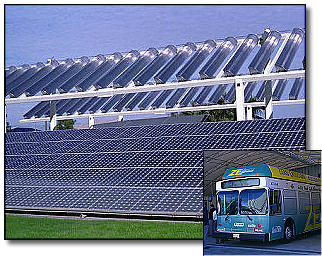
Image: NREL
 |
ASES champions
hydrogen energy systems that incoroporate clean renewables such as this
solar PV array at the Sunline transit agency in California that powers a
hydrogen electrolizer for the fuel cell bus (inset). Image: NREL |
"Hydrogen is clean only if it's produced from clean sources.
Hydrogen is dirty if it's produced from dirty sources."
- Dr. Yogi Goswami, Ph.D., University of Florida, Director of the University's
Solar Energy and Energy Conversion Laboratory
| Washington D.C. -
October 29, 2003 [SolarAccess.com] A new report from the American
Solar Energy Society (ASES) finds that hydrogen generated by renewable
energy resources, is the most sustainable, secure, healthy, economic,
environmentally friendly and socially compatible new energy option.
While the organization of scientists and energy policy experts have
called for a national commitment to exploit the vast clean potential of
hydrogen fuel generated by renewable resources, they lament the
predominantly fossil fuel-derived direction the U.S. Department of
Energy (DOE) is taking with their Hydrogen Energy Roadmap. "How we produce hydrogen is an extremely important decision," said Dr. Yogi Goswami, Ph.D., University of Florida, Director of the University's Solar Energy and Energy Conversion Laboratory. "Hydrogen is clean only if it's produced from clean sources. Hydrogen is dirty if it's produced from dirty sources." According to ASES, these are complex social and political problems that require intense commitment and resources, at a time when skyrocketing health costs, global warming, terrorism and environmental degradation threaten America's security. "Unfortunately the Energy Department's (DOE) Hydrogen Energy Roadmap is driving America's new hydrogen policy down the same old dead-end road," said ASES Chair of Michael H. Nicklas. "DOE's Hydrogen Roadmap is dominated by fossil and nuclear power promoters; renewables have very little role in their vision of a hydrogen future." Acknowledging that it is not a panacea, ASES said this new comprehensive assessment finds that renewably generated hydrogen is one of the most multi-faceted, positive solutions to these and related issues confronting our society. "Today, in much of the Southeastern U.S., one in every 2,500 citizens dies prematurely because of power plant emissions," said Dr. Anthony J. DeLucia, Ph.D., Past Chair, American Lung Association and Professor of Surgery at the James H. Quillen School of Medicine at East Tennessee State University. "Renewable hydrogen offers a healthy choice to meet today's and tomorrow's energy needs." ASES said that strong federal leadership and a national commitment are imperative to fulfill the promise of this virtually inexhaustible resource. "The first step in taking command of our energy future is to make a national commitment to ending our dependence on carbon-based fuels. Renewable hydrogen is the key to that future," said Dr. Paul Scott, Ph.D., a consulting scientist in wind- and solar-hydrogen systems, who has designed and built hydrogen fueled internal combustion engines and electric hybrid and fuel cell buses. "Hydrogen fuel can be 'grown domestically' from the wind, solar energy or biomass. The wind of the Dakotas alone could provide hydrogen fuel for the entire nation." Working with a solar-powered hydrogen demonstration motor, Dr. Scott showed how renewable energy could easily and cleanly produce hydrogen gas through electrolysis. Large scale solar, wind or biomass hydrogen production facilities can be developed in every region of the country. However, only a concerted, focused national initiative will bring the "hydrogen revolution" from the drawing board to the gas tank, the power plant and the home. The scientists' primary recommendations, include: - Energy Security Launch: a major renewable hydrogen initiative to eliminate the very great risks associated with carbon sequestration and nuclear power's waste and security issues. Such an initiative will improve health, support environmental integrity, reduce terrorist targets and lower our balance of payments. - Global Climate Change: The Administration must change course and acknowledge that burning fossil fuels causes global warming. Renewable hydrogen can reduce carbon dioxide emissions by three kilograms for every kilogram of hydrogen produced. - Health Costs: A "no exemptions" standard for power plants to clean our air and improve our health. A hydrogen future fueled by coal will not allow us to breathe easier; hydrogen produced from renewable energy will. At the earliest opportunity, hydrogen fueled internal combustion engine vehicles should be deployed in significant numbers and their impact assessed in key non-attainment cities. - Flexibility and Diversity: Renewable hydrogen is abundant and omnipresent in the United States. Every part of the country has the ability to produce hydrogen locally. We recommend that the National Renewable Energy Laboratory be directed to devise a national profile of the key renewable hydrogen resources in each part of the country, estimate their near-term hydrogen production capacity and devise a plan for their earliest possible deployment. - Economic Risk: Current utility financial success is based largely on fuel costs volatility over time; and renewable energy is, by far, less risky for the consumer. - Promotion of good science: The scientific process used to evaluate the various hydrogen production options must be conducted in a fair, open and competent manner and that all data, assessments, methodology and findings be made public. - Go straight toward a sustainable energy future: Congress and the Administration must support research, development and deployment of technologies that build toward a sustainable energy economy. Funds should not be allocated in attempts to promote new ways of using fossil and nuclear energy. Renewable energy research must be fully funded to the FY 1998 level and significantly increased from that level in succeeding years. |
|
|
| For
Further Information: • ASES Renewable Hydrogen Forum Report (.pdf) Please Note: SolarAccess.com and Arizonaenergy.org do not endorse the sites behind these links. We offer them for your additional research. Following these links will open a new browser window. |